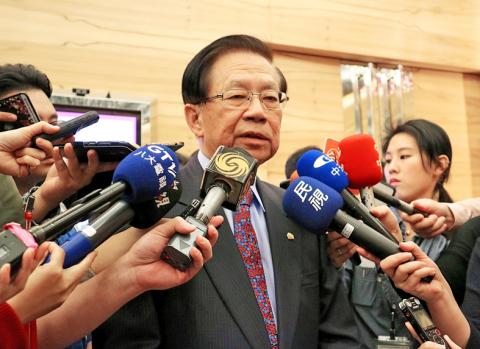Straits Exchange Foundation (SEF) Chairman Tien Hung-mao (田弘茂) yesterday said he would like to invite China’s Association for Relations Across the Taiwan Straits (ARATS) Chairman Chen Deming (陳德銘) for talks at an opportune time, preferably on Kinmen.
Tien made the remark at the foundation’s end of the Lunar Year media luncheon in Taipei, saying that Beijing should seriously consider his proposal.
There has been a high level of “attention and even anxiety from some quarters” with the current state of cross-strait relations, which had “undeniably showed signs of retrograde development” since the transition of government in Taiwan, with Beijing rejecting proposals to “smooth relations,” Tien said.

Photo: CNA
US president-elect Donald Trump’s policies might prove influential in the international community and complicate cross-strait relations, Tien added.
While Taiwan must respond to changing conditions prudently, the overall situation is not as severe as some had feared, Tien said.
“Looking back on our experience over the past 20 years, one could say the situation across the Taiwan Strait was often more severe than what is found currently and they were certainly more difficult to deal with. As interactions accumulate, cross-strait relations had became more complex and diversified, the foundation’s commitment and crucial role in negotiation, exchange and service have not changed,” he said.
“We continue to assert the principles of no political preconditions, mutual respect and openness to innovation as the basis of talks with Beijing, while showing goodwill and creating a friendly environment for communication,” he said, adding that the government wants exchanges with China by previously established institutions to “return to normal.”
“I understand that Chen has visited Taiwan three times, but had never set foot on Kinmen. If it proves opportune, I look forward to meeting him there. Kinmen is a good place to start meeting. I hope Beijing will take this proposal seriously,” Tien said.
When asked to comment on China’s insistence on the “one China” principle, Tien said President Tsai Ing-wen (蔡英文) had on multiple occasions made clear statements regarding the government’s position and her remarks are the basis for the future conduct of cross-strait relations.
Tien declined to elaborate on Tsai’s position on the so-called “1992 consensus,” saying: “I believe the Presidential Office is the only appropriate authority to comment on such issues.”
The “1992 consensus,” a term former Mainland Affairs Council chairman Su Chi (蘇起) in 2006 admitted making up in 2000, refers to a tacit understanding between the Chinese Nationalist Party (KMT) and the Chinese government that both sides of the Strait acknowledge there is “one China,” with each side having its own interpretation of what “China” means.

Taiwan is to commence mass production of the Tien Kung (天弓, “Sky Bow”) III, IV and V missiles by the second quarter of this year if the legislature approves the government’s NT$1.25 trillion (US$39.78 billion) special defense budget, an official said yesterday. Commenting on condition of anonymity, a defense official with knowledge of the matter said that the advanced systems are expected to provide crucial capabilities against ballistic and cruise missiles for the proposed “T-Dome,” an advanced, multi-layered air defense network. The Tien Kung III is an air defense missile with a maximum interception altitude of 35km. The Tien Kung IV and V

The disruption of 941 flights in and out of Taiwan due to China’s large-scale military exercises was no accident, but rather the result of a “quasi-blockade” used to simulate creating the air and sea routes needed for an amphibious landing, a military expert said. The disruptions occurred on Tuesday and lasted about 10 hours as China conducted live-fire drills in the Taiwan Strait. The Civil Aviation Administration (CAA) said the exercises affected 857 international flights and 84 domestic flights, affecting more than 100,000 travelers. Su Tzu-yun (蘇紫雲), a research fellow at the government-sponsored Institute for National Defense and Security Research, said the air

Taiwan lacks effective and cost-efficient armaments to intercept rockets, making the planned “T-Dome” interception system necessary, two experts said on Tuesday. The concerns were raised after China’s military fired two waves of rockets during live-fire drills around Taiwan on Tuesday, part of two-day exercises code-named “Justice Mission 2025.” The first wave involved 17 rockets launched at 9am from Pingtan in China’s Fujian Province, according to Lieutenant General Hsieh Jih-sheng (謝日升) of the Office of the Deputy Chief of the General Staff for Intelligence at the Ministry of National Defense. Those rockets landed 70 nautical miles (129.6km) northeast of Keelung without flying over Taiwan,

A strong continental cold air mass is to bring pollutants to Taiwan from tomorrow, the Ministry of Environment said today, as it issued an “orange” air quality alert for most of the country. All of Taiwan except for Hualien and Taitung counties is to be under an “orange” air quality alert tomorrow, indicating air quality that is unhealthy for sensitive groups. In China, areas from Shandong to Shanghai have been enveloped in haze since Saturday, the ministry said in a news release. Yesterday, hourly concentrations of PM2.5 in these areas ranged from 65 to 160 micrograms per cubic meter (mg/m³), and pollutants were